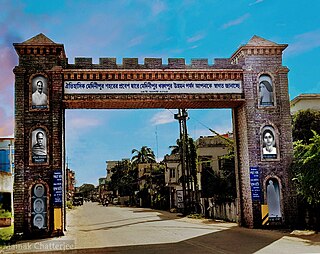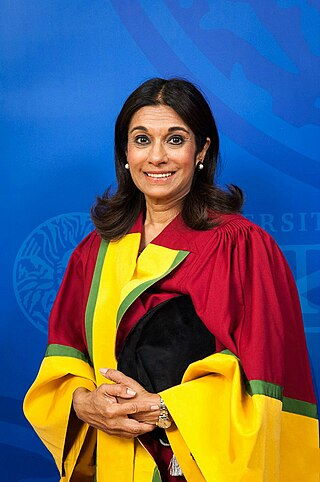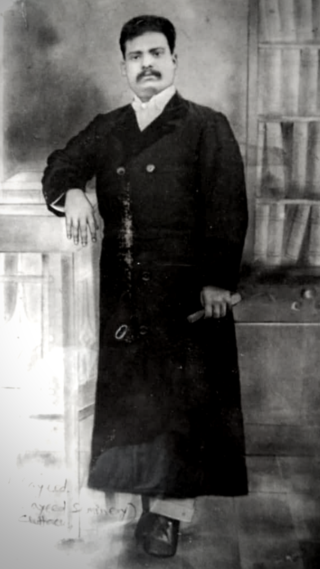Related Research Articles

BegumShaista Suhrawardy Ikramullah was a Bengali Pakistani politician, diplomat and author. She was the first Muslim woman to earn a PhD from the University of London. She was Pakistan's ambassador to Morocco from 1964 to 1967, and a delegate to the United Nations, calling for a more gender-inclusive language in the Universal Declaration of Human Rights.

Medinipur or Midnapore is a city known for its history in the Indian state of West Bengal. It is the headquarters of the West Medinipur district. It is situated on the banks of the Kangsabati River. The Urban Agglomeration of Midnapore consists of the city proper, Mohanpur, Keranichati and Khayerullachak. Midnapore and its neighbouring city of Kharagpur constitute the central core of the Midnapore Kharagpur Development Authority metro area, spread across 576 square kilometres.

Cuttack district is one of the 30 districts of Odisha state in India. It is located in the coastal part of the state and its administrative headquarters are located in the city of Cuttack. As of 2011 Census, after Ganjam, it is the second most populous district of Odisha, with a population of 2,624,470. The name is an anglicized form of Kataka or Katak meaning Fort – referring to the Barabati Fort. The district is bisected by the river Mahanadi and its numerous distributaries and occupies a large portion of the river's delta. It is bounded by the Angul, Dhenkanal, Nayagarh and Khurda districts to the west while its southern and eastern boundaries touch Puri, Jagatsinghpur, Kendrapara and Jajpur districts.
Suhrawardi or Sohrevardi or variants may refer to:

Princess Sarvath El Hassan is a Jordanian royal and the wife of Prince Hassan bin Talal of Jordan. She was born in Calcutta on 24 July 1947, to a prominent Muslim family, the Suhrawardy family of the Indian subcontinent.

Ravenshaw University, formerly known as Ravenshaw College, is a co-educational state university situated in Cuttack, Odisha on the eastern coast of India. Founded as Ravenshaw College in 1868, the institution became a university in 2006. The university has nine schools, thirty three academic departments and a student enrolment of nearly 8,000. It is one of the oldest educational institutes in the country and its history is synonymous with the history of modern Odisha.

According to the 2011 census, West Bengal has over 24.6 million Muslims, making up 27% of the state's population. The vast majority of Muslims in West Bengal are ethnic native Bengali Muslims, numbering around over 22 million and comprising 24.1% of the state population. There also exists an Immigrants Urdu-speaking Muslim community numbering 2.6 million, constituting 2.9% of the state population and mostly resides in Urban areas of the state.

Ravenshaw Collegiate School is the oldest High School of Odisha which was established in 1851 by Thomas Edward Ravenshaw in the District of Cuttack in Odisha, India. It was one of three institutions founded by Ravenshaw, the other two being the Ravenshaw Girls' School and the Ravenshaw College, the latter now having become Ravenshaw University.

Devendra Sharma is an Indian politician, currently serving as a Member of Legislative Assembly. He is one of the strong leaders of Odisha Pradesh Congress Committee and a member of Opposition in the Odisha Legislative Assembly. He is the 15th MLA, elected from the Aul constituency in 2014. He belongs to the Indian National Congress party.
Mohammad Mohsin called popularly as Mohsin was an Indian actor, director and producer. In his movie career spanning more than 30 years across Bollywood, Odisha and West Bengal, he has acted and directed in many commercially successful movies. Mohsin started a revolution in commercial Odia movies and connected with the pulse of his audience. His movies ranged from social drama to action packed crime thrillers. Mohsin made his first Bollywood debut in the movie Naiyya, in which he played the character of Karim. Naiyya was produced and distributed by Rajshri Productions, which was a remake of Odia movie Shesha Shrabana, in which Mohsin played the character of a boat maker.

Sayeed Mohammed was an Indian Odia educationist, freedom fighter and philanthropist. In 1913, he founded the Moslem Seminary at Cuttack, which is regarded as the second nationalist school of Odisha. Sayeed is known for his activism against the British in the early 1900s. He was one of the prominent members of the Utkal Sammilani. In 1922, Sayeed along with Ekram Rasul co-founded the All Odisha Khilafat Committee, in the wake of the non-cooperation movement in India.

Mohammed Afzal-ul Amin, popularly known as M.A. Amin, was an Indian statesman, politician and social worker from Cuttack, Odisha. He served as the general secretary of Utkal Pradesh Congress Committee during Biren Mitra's chief ministership. Afzal-ul was the Vice Chairman and later the Chairman of Cuttack Municipality and also the President of Odisha Mohammadan Association. He played a major role in preserving Urdu language in Cuttack by establishing several lower primary and upper primary Urdu schools in the city. He is also credited for organising various nationalist meetings and for mobilizing the common masses in Cuttack during the Quit India movement of 1942.
Farhat Amin is an Indian journalist, cartoonist and social activist. She's Odisha's state convenor of Bharatiya Muslim Mahila Andolan, a national rights based organisation which fights for the rights of Muslim women. Farhat is the founder and chief functionary of BIRD Trust, a non-governmental organisation which works for the upliftment of marginalized women in Odisha. She is the pioneer of Muslim women movement in Odisha. In 2005 she was enlisted in the directory of Development journalists published by the prestigious Press Institute of India.
Ibrahim Suhrawardy was an Indian educationist, author and linguist from Balasore, Odisha. He is credited to have written the first English grammar books in Odia for the native students. He achieved high distinction in English studies in British India and taught many generations of students and scholars how western languages could be pursued to great educational advantage. Ibrahim was also the first muslim from Orissa province to have qualified the prestigious Indian Civil Services Examinations in 1921. He was one of the active Satyagrahis during the Inchudi Satyagraha movement in 1930.

Qadam e Rasool, situated at Cuttack, is a shrine and an important specimen of Mughal architecture in Odisha. In the Qadam Rasool premises are present numerous dargahs, two masjids, namely Moti Masjid and Qadam e Rasool Masjid and several inscriptions.

Khujista Akhtar Banu Suhrawardiyya popularly known as Suhrawardy Begum was a late 19th century writer, Bengali socialite, educationist and a social reformer. Khujista was the first Indian woman to pass the Senior Cambridge examinations, in the year 1887. She was also the first Indian woman to be appointed as an examiner by the prestigious Calcutta University. She was the mother of Huseyn Shaheed Suhrawardy, the former Prime Minister of Bengal.
The Suhrawardy family with over nine hundred years of recorded history has been one of the oldest leading noble families and political dynasties of the Indian subcontinent and is regarded as an important influencer during the Bengali Renaissance. The family has produced many intellectuals who have contributed substantially in the fields of politics, education, literature, art, poetry, socio-religious and social reformation. Numerous members of the family, both biological descendants and those married into the family, have had prolific careers as politicians, lawyers, judges, barristers, artists, academicians, social workers, activists, writers, public intellectuals, ministers, educationists, statesmen, diplomats and social reformers.

Sayeed Seminary School is a public school located in the heart of Cuttack city, India. It was established in 1913 by Sayeed Mohammed, a prominent Odia freedom fighter, scholar and educationist. The school is credited to be the second nationalist school of Odisha and is one of the two institutions bearing the name of Sayeed Mohammed, the other one being Sayeed Seminary Primary School, which is located within the campus of the former.
Amin Suhrawardy was a Bengali judge, academic and a prominent sorcerer of his time. He served as the subordinate judge of Calcutta High court from 1887 to 1891. He was a professor of law at Calcutta University. Amin also had a parallel career in the field of stage magic and is regarded as one of the pioneers of the field in Bengal.

Nawabzadi Umdatunnissa Begum was the queen consort of Nawab Syed Ahmed Hassan of Kharui Raj. She served as the regent of Kharui for 20 long years i.e. from 1892 to 1912. Nawab Begum gave up purdaah and went to the Court of Wards, Calcutta to fight against the arbitrary economic policies introduced by the British, because of which her estate had suffered severe losses. She challenged the British government in their own court and won the legal battle against them, making her one of the first woman royalties in British Bengal to do so.
References
- ↑ CHATTERJEE, KABERI (1996). "PROMOTION OF FEMALE EDUCATION IN 19TH CENTURY BENGAL". Proceedings of the Indian History Congress. 57: 767–769. ISSN 2249-1937.
- ↑ Sircar, Partha (26 May 2016). "Early Women's Education in Bengal and India". Best Indian American Magazine | San Jose CA | India Currents. Retrieved 14 June 2020.
- ↑ "Ravenshaw Girls High School-Cuttack". Schosys. Retrieved 14 June 2020.
- ↑ "Ravenshaw Girls' High School | Oriya Bazar, Cuttack, Odisha | Schools - Joon Square". www.joonsquare.com. Retrieved 14 June 2020.
- ↑ "GRIN - Female Education in 18th and 19th Century Britain". www.grin.com. Retrieved 14 June 2020.